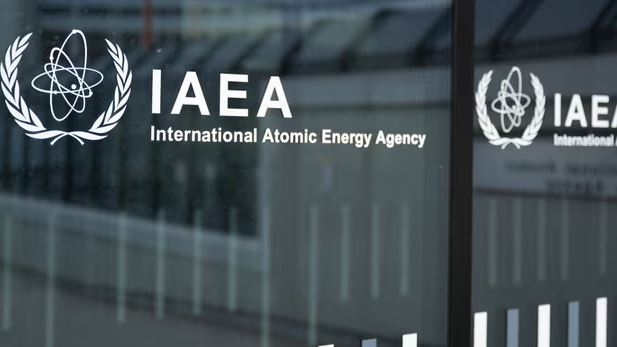Iran’s parliament passes bill to halt cooperation with IAEA
Pakistan at UN calls for peaceful means to resolve Iran nuclear issue
TEHRAN: Iran’s parliament approved a bill on Wednesday to suspend cooperation with the UN nuclear watchdog International Atomic Energy Agency (IAEA), state-affiliated news outlet Nournews reported.
Iran parliament votes to suspend cooperation with International Atomic Energy Agency
The move, which needs the final approval of Iran’s Supreme National Security Council to be enforced according to Nournews, follows an air war with Israel in which its longtime enemy said it wanted to prevent Tehran developing a nuclear weapon.
Parliament Speaker Mohammad BaqerQalibaf was quoted by state media as also saying Iran would accelerate its civilian nuclear programme.
Tehran denies seeking nuclear weapons and says a resolution adopted this month by the IAEA declaring Iran in breach of its non-proliferation obligations paved the way for Israel’s attacks.
The parliament speaker was quoted as saying the IAEA had refused even to appear to condemn the attack on Iran’s nuclear facilities and “has put its international credibility up for sale”.
He said that “for this reason, the Atomic Energy Organisation of Iran will suspend its cooperation with the Agency until the security of the nuclear facilities is guaranteed, and move at a faster pace with the country’s peaceful nuclear programme”.
Earlier this week, parliament’s national security committee approved the bill’s general outline and the committee’s spokesperson, EbrahimRezaei, said the bill would suspend the installation of surveillance cameras, inspections and filing of reports to the IAEA.
Following the Israeli attacks on its nuclear sites, and US bombing of underground Iranian nuclear facilities at the weekend, the Iranian government also faces calls to limit the country’s commitments to the nuclear non-proliferation regime.
In an interview with Qatar’s Al-Araby Al-Jadeed on Tuesday, Foreign Minister Abbas Araqchi said: “I think that our view on our nuclear programme and the non-proliferation regime will witness changes, but it is not possible to say in what direction”.
Pakistan calls for peaceful means to resolve Iran nuclear issue
Pakistan reaffirmed its support for resolving Iran nuclear issue through peaceful means when the UN Security Council on Tuesday discussed the latest developments related to the implementation of its 2015 resolution endorsing the Joint Comprehensive Plan of Action (JCPOA), which limits the Iranian atomic programme.
“Diplomatic engagement and the resumption of dialogue are the best means to resolve all outstanding issues,” Ambassador AsimIftikhar Ahmad, permanent representative of Pakistan to the UN, told the 15-member Council on Tuesday.
“Diplomacy has delivered previously and with the necessary political will, it can certainly deliver again,” he said, referring to JCPOA, which was signed in 2015 after extensive negotiations between Iran and several world several world powers, including the United States.
The US, however, withdrew from the agreement in 2018 under the Trump administration, and the deal is now considered “essentially defunct”.
Tuesday’s Security Council session followed a brokered ceasefire that brought a pause to recent hostilities — air strikes by Israel and the United States on Iranian nuclear sites, and Tehran’s subsequent missile attacks on a United States base in Qatar.
In his remarks, Ambassador AsimIftikhar said the IAEA, the UN agency responsible for verifying compliance with respective nuclear safeguards obligations of member states, must be enabled to fulfil this statutory function.
“We believe that verification activities by the IAEA should continue unimpeded,” he added.
The Security Council, the Pakistani envoy said, should allow sufficient time to continuing efforts between the IAEA and Iran as well as other parties to resolve outstanding issues.
Recent developments, he said, have yet again manifested the grave dangers that present themselves when there are violations of the UN Charter and international law.
“The cost of seeking to resolve issues through military means is more than evident,” he said, adding, “The region, and indeed the whole world, cannot be hostage to such adventures, dangerous precedents and spiraling escalations.”
With regards to recent developments, Ambassador AsimIftikhar emphasized:
— Condemnation of violation of the sovereignty and territorial integrity of member states and, of the threat or use of force to settle disputes;
— Rejection of attacks on IAEA-safeguarded nuclear facilities;
— Sustained cessation of hostilities and a permanent ceasefire to allow resumption of dialogue and verification activities by the IAEA, and,
— Renew diplomatic engagement to seriously and faithfully address the outstanding issues in a cooperative manner.
In conclusion, the Ambassador AsimIftikhar informed the Council that together with Russia and China, Pakistan has proposed a draft Council resolution in search of a peaceful solution to the concerns surrounding Iran’s nuclear programme.
He said the sponsors will propose an updated version of its Sunday’s resolution that takes into consideration the latest developments to ensure the sustainability of the ceasefire and the Council’s oversight of it.
Earlier, addressing the Council meeting held to try and revive the deal amid the dramatic military escalation of the past 12 days, UN political affairs chief Rosemary DiCarlo said the fragile ceasefire announced by Donald Trump overnight provided “an opportunity to avoid a catastrophic escalation and achieve a peaceful resolution of the Iran nuclear issue.
Ms. DiCarlo told the Council the recent surge in violence had significantly undermined diplomatic momentum.
“The military escalation between Israel and Iran since 13 June and United States air strikes on Iran’s nuclear facilities on 21 June complicated prospects for achieving full implementation of resolution 2231,” Ms. DiCarlo said.
“Iran’s strikes yesterday on a base in Qatar further exacerbated insecurity in an already tense region.”
Despite five rounds of bilateral talks between Iran and the US, facilitated by Oman in recent months, Ms. DiCarlo noted that efforts “did not produce a way forward” to restore full JCPOA implementation. Agencies




